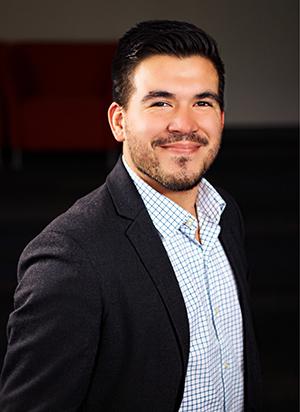
By Louis Scola MPP ‘20

What I liked most about the Master of Public Policy program at Sanford is that the degree is essentially a "Choose Your Own Adventure" graduate program. At the beginning of my MPP experience, I decided to pursue courses that help me strengthen my hands-on community problem-solving skills in an applied setting.
Specifically, I was interested in finding courses that brought innovative and non-traditional approaches to public policy. During my course selection for Spring 2019, I found Tom Allin and Blythe Meyer's class "Using Human-centered Design to Improve the Citizen Experience" and thought it satisfied what I was looking for in my graduate coursework. The course syllabus described human-centered design (HCD) as "a creative approach to problem-solving that starts with the people one is designing for and ends with new solutions that are tailored to meet their needs."
In the course last spring, I worked with four other students to use design thinking to address issues with the residential experience at Triangle Residential Options for Substance Abusers (TROSA). I enjoyed how the client-based, problem-solving component of the course was non-linear, agile, collaborative, and iterative.
After the class ended, I knew I would like to hone my HCD skills further. Tom offered another student, Matthew Lanza, and me the opportunity to work on an HCD project related to veterans since we would be in town for other internships over the summer. So, instead of completing just one internship to satisfy the MPP mandatory requirement, I was able to complete two.
In May 2019, Tom brought us onto the project to learn more about the experience for veterans at Duke. Our process consisted of three phases: research, synthesis, and documentation. This experience was significant to me because I had the opportunity to help improve veterans' higher education experience. While none of my immediate relatives were service members, I was enrolled in the Naval ROTC program during my undergraduate experience at the University of Missouri. I ended up being unable to serve, but have many friends in the Navy and Marine Corps who help sailors and marines navigate life after service. I saw this project as one way that I could help veterans.
Through our work last summer, I learned a lot about veterans' enlisted experience and how individuals without an understanding of the military perceive this population in a monolithic way. But, as it relates to increasing veteran access to undergraduate education programs at Ivy League institutions (including Duke University), I learned that veterans face similar issues to low-income and first-generation college students.
Moreover, I solidified my belief that utilizing human-centered design is a unique way to understand how public policy at the federal, state and local levels impact the lived experiences of people, like veterans. The design of the veteran experience is primarily attributed to how the United States public policy set up the military. The military in of itself is a microcosm of American society; healthcare, education, housing, anything you can think of as an issue for the general public is also an issue for the active-duty military and the veteran population of the country. It's more than war-fighting. Understanding this structure is integral to understanding how the policies impact veterans' lives.
Regardless of policy area, once you firmly grasp the original design of the environment you are navigating, you can start problem-solving by focusing on the people that you are designing for and deliver new solutions that are made to suit their needs. By understanding the environment and its stakeholders, creating new concepts and business models, and then building new operational systems, veteran service providers can best address veterans' needs and wishes as they relate to a wide variety of issues.
Based on my experience, I think the issues surrounding veterans and homelessness, substance abuse, and mental health services should be studied and researched with this methodology. Applying a human-centered, empathetic approach to these studies would likely identify innate needs that organizations and groups serving these populations could address with relative ease and effectiveness.
I was looking for a challenging, hands-on course that forced me to grow in a way that I never thought I could while delivering a product that will have an immediate impact on a group of people. This course was a perfect match. While the course is a lot of work, and Tom Allin expects a lot out of his students, he has a vested interest in pushing his students to do their very best because the rewards from the hard work are incredible. After taking Tom's course and working with him and my classmate, I have been able to talk about the work I have accomplished in a meaningful and compelling way that resonates with employers across industries.
Louis Scola completed his MPP degree in May 2020. He is currently working with Downtown Durham Inc., to complete an assessment related to homelessness in the community. He is pursuing a career in community and economic development to catalyze positive change and make an impact.
- Learn more about Louis and MPP students on Humans of Duke Sanford
- Learn more about the course
- Related: news about the course
